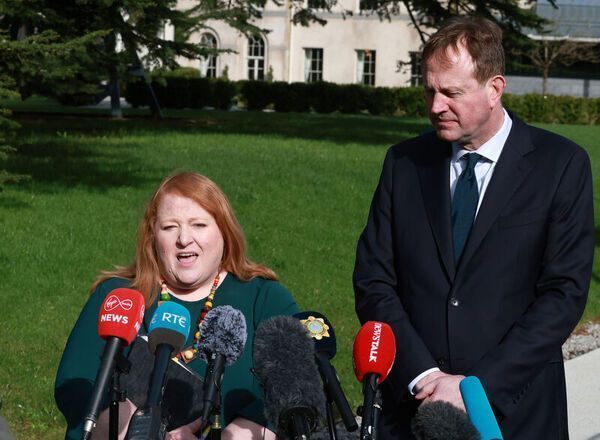District Attorney Rachael Rollins will speak at the 2021 Irish Echo Top 40 Under 40 virtual presentation this evening, which begins at 6 p.m. Rollins appears in episodes 7 and 8 of the Netflix documentary "Trial 4" as a candidate and the DA-elect of Suffolk County, Mass.
Screen Time / By Peter McDermott
“I learned about Sean’s conviction in the most uncanny way.”
So says Elaine Murphy in the Netflix documentary series “Trial 4.”
She was at that time, in 1995, living in Montreal and friends were visiting from New England. They had with them a copy of the Boston Globe, which was tossed onto her kitchen counter.
She was “shattered, dumbstruck” by the main story on the front page. It reported that a 21-year-old from Dorchester, Sean Ellis, had been found guilty of the Sept. 26, 1993, murder of Boston Detective John Mulligan. It had been the third trial, and he was sentenced to serve life without the possibility of parole.
It spoke to “two different Americas” for her.
She thought, “My God, this would never have happened to my son Mark.”
As a child, Sean Ellis was bussed into Mark Murphy’s middle-class suburban neighborhood as part of a private program and the two became fast friends. Elaine Murphy remembered the “sweet, shy, gentle boy” who was a frequent guest at her home in the 1980s. She wondered what turns in his life had led to a murder conviction; then she found out more and vowed to help. Murphy is still on the case, 25 years on.
Late on in “Trial 4” at an event highlighting wrongful convictions Ellis speaks in praise of the strong women in his life, citing Murphy, defense attorney Rosemary Scapicchio, co-defense counsel Jillise McDonough, Superior Court of Massachusetts Judge Carol S. Ball, his mother, his sister and others.

Elaine Murphy has campaigned on Sean Ellis's behalf since the 1990s.
Yet another strong woman comes into the story in “Black Irish,” the seventh of the eight installments; Rachael Rollins’s election as Suffolk County DA has changed the dynamics of the story, both directly and indirectly.
“The fact that we are being willfully blind, or actively looking away, is wrong. And it’s not happening on my watch,” she told the Boston Globe’s Adrian Walker for a December column headlined “Sean Ellis’s quest for justice remains maddeningly unfinished.” (Rollins is a guest speaker at the 2021 Irish Echo Top 40 Under 40 this evening, beginning at 6.)
The pioneer when it comes to the modern true-crime series is “The Staircase,” which is currently live-streaming on Netflix. Its focus is novelist Michael Peterson, who stood trial for the murder of his wife Kathleen Peterson at their Durham, N.C. home in December 2001.
Around about the time he began filming the Peterson story, director Jean-Xavier de Lestrade won the documentary Oscar for his “Murder on a Sunday Morning,” about a 16-year-old Black youth convicted on the basis of eye-witness testimony and forced confession at the hands of police in Jacksonville, Fla.
Now, de Lestrade would test his thesis that it’s difficult to get a fair trial in America even in the case of a middle-aged, middle-class white man.
De Lestrade is the co-executive producer on “Trial 4.” There is some similarity in approach with “The Staircase,” most notably in the defendant/prisoner and his defense lawyer being the two central personalities in a drama filled with a large cast of characters. Peterson’s lawyer from the beginning was David Rudolf, who de Lestrade and his producer have told us has never doubted his client’s innocence.
[caption id="attachment_113210" align="alignnone" width="300"]
Rudolf’s faith in the system was shaken to its foundations, he later revealed, the moment he heard the verdict read. It’s de Lestrade’s hidden hand, one presumes, that leads the viewer to question the wisdom of the lawyer’s strategy, which was based on stressing the concept of “reasonable doubt.” It certainly seems naive, in retrospect. But then we're viewing a TV show; we didn't sit through what was a long trial. (The original series was broadcast in 2004 and there were several updates through 2018. It can now be streamed in its entirety.)

Michael Peterson (wearing glasses) sits between his lawyers David Rudolf, left, and Tom Maher in “The Staircase.” PHOTO: DAVIDSRUDOLF.COM
Likewise, Ellis and Scapicchio are the stars of “Trial 4.” But what a contrast they are to the other two. You can see why Peterson’s children love him, but also how his arrogance divides people (just as the issue of whether he’s guilty or not continues to); whereas Ellis, who has conquered a stutter, is calmly eloquent and very likable. Rudolf is a natural leader and communicator, but his self-possession and expensive suits put him at a disadvantage in a Durham courtroom. Scapicchio has just one setting, it seems — tireless advocate and strategist on your behalf, whether she’s talking with her mother (who brought up a large family alone in public housing) at the dinner table, a TV interviewer, a documentary crew or a judge. Small talk is likely not her forte.
Rudolf stayed loyally on the case from the first days until its resolution; Scapicchio was brought in at Ellis’s invitation early in his second decade behind bars (the original trial lawyers were perfectly competent and are interviewed on screen, but it turns out they were operating blind).
The Durham case is hotly contested; you can see how difficult it is for Rudolf and his partner Tom Maher to construct a counter-narrative that sells. In the other case, it’s not even close. By 2015 and 2016, Scapicchio is, in the Globe’s Walker’s words, “[driving holes] the size of a truck through the prosecution’s case.”
The Peterson story is full of exciting twists and turns, and “The Staircase” has all the nerve-jangling tension of a classic courtroom drama on the big screen. “Trial 4,” meantime, takes a sober backward glance at three trials, aided by the insightful perspectives of a juror from each of the first two — Catherine Hunt and Raymond Mulvey.
The makers of “The Staircase” weren’t to know that a key expert witness for the prosecution would later be discredited, tainting all of his cases. Its focus is more on the petty corruptions, incompetencies and prejudices that work against the defendant.
Boston itself is a character in “Trial 4” and its corruptions are on a far grander, more depressing scale. The Globe’s investigative mindset redeems the city, however, by helping to put away two corrupt detectives.
The “game-changer,” though, comes via sleuthing by Ellis’s own team and it prompts Judge Ball to release him on bail in 2015, a full 22 years after he was first arrested. It shouldn’t have had to come to that. Beyond the corruption, Scapicchio has a particular contempt for those who are implicated in their refusal to see it. She wants to know how such people sleep at night.
In this spirit, “Trial 4,” at least once per episode, features the names of 26 people who declined or didn’t reply to requests to participate.









